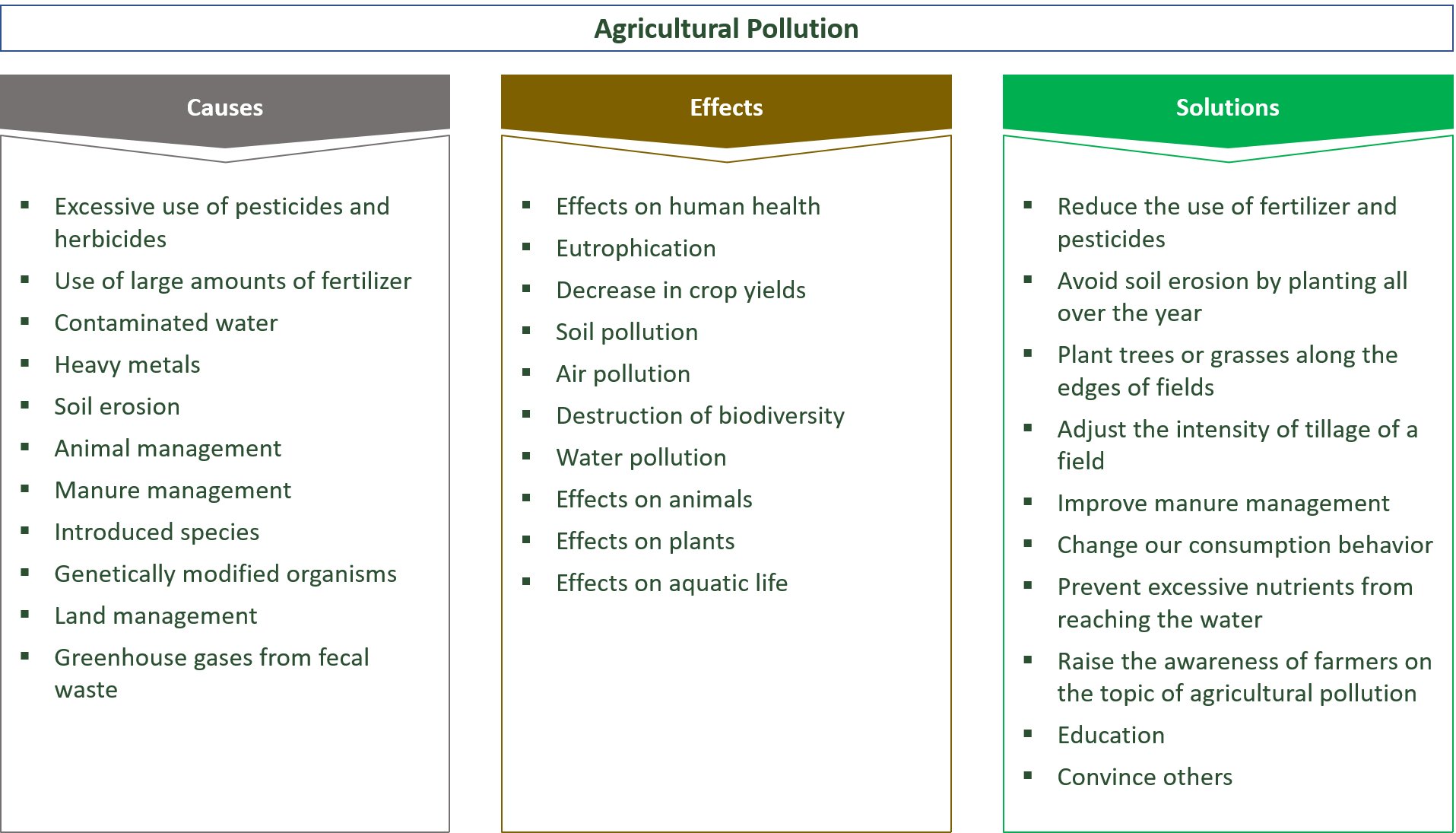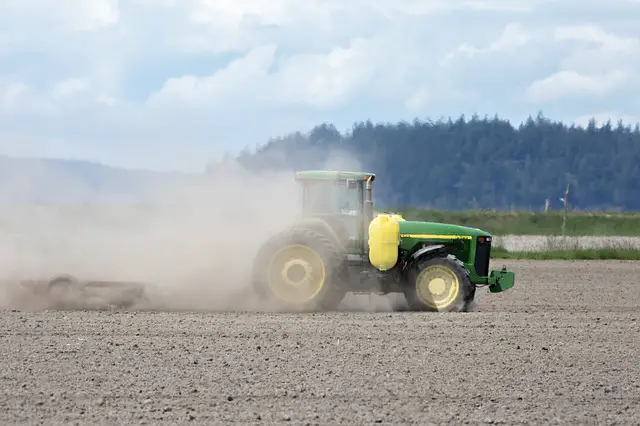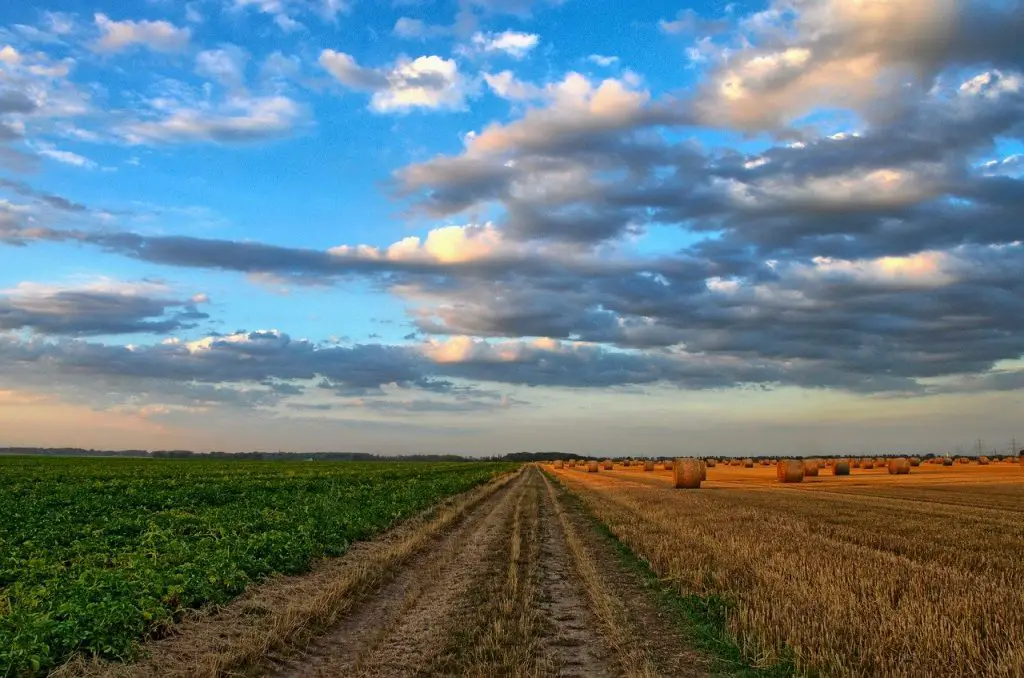“Agriculture is one of the biggest causes of greenhouse gases in the atmosphere. Cars? Planes? Trains? Nope. Cow farts.”
Zazie Beetz
Agricultural Pollution: Causes, Effects & Solutions

Agricultural pollution can be defined as the degradation or contamination of the environment through abiotic and biotic byproducts of farming.
For many years, our ancestors did farming in a sustainable way, thus there were almost no problems with agricultural pollution.
However, due to the optimization of yields over time through the excessive use of fertilizers and pesticides, agricultural pollution became a significant problem for the environment.
There are also many other sources of agricultural pollution.
The sources as well as solutions related to agricultural pollution are shown in the following.
Audio Lesson
Contents
Causes for Agricultural Pollution
- Excessive use of pesticides and herbicides
- Use of large amounts of fertilizer
- Contaminated water
- Heavy metals
- Soil erosion
- Animal management
- Manure management
- Introduced species
- Genetically modified organisms
- Land management
- Greenhouse gases from fecal waste
Excessive use of pesticides and herbicides
The excessive use of pesticides and herbicides in order to optimize yields has become a big problem for the environment.
Pesticides and herbicides contain many chemicals that can impact the ecological system in an adverse manner.
The crops contaminated with these chemicals are eaten by us which can cause health issues for sensible people.
Moreover, the chemicals are washed through the soil in the groundwater and thus contaminate it.
In addition, animals will eat part of the crops and plants and are harmed by the chemicals as well.
Use of large amounts of fertilizer
A similar problem occurs from the use of fertilizers.
An excessive fertilizer use leads to contamination of rivers and lakes with nitrates and phosphates which causes algae contamination and thus harms the water environment.
Using large amounts of fertilizer can also contaminate the groundwater and thus harms the whole ecosystem, including humans, plants and animals.
Contaminated water
The use of contaminated water for agricultural purposes is a significant issue.
While most of the water in developed countries is relatively clean, this can be quite different in developing countries.
The water can be contaminated due to the disposal of industrial, agricultural or private waste into rivers, lakes or other water systems.
This can cause the crops being contaminated with chemicals and harmful elements like lead or even mercury.
In turn, these crops are used by humans as well as to feed animals and thus can harm both in a severe way.
Heavy metals
The use of fertilizers and organic waste like manure can also lead to an accumulation of heavy metals in the soil.
Some farming techniques like irrigation can lead to an accumulation of selenium.
The accumulation of heavy metals can lead to the contamination of the groundwater and may thus harm animals, plants and even humans on later stages.
Soil erosion
Soil erosion and sedimentation can be regarded as a natural form of agricultural pollution, however, it can also be harmful to the environment.
Farmers are often not aware of soil erosion and sedimentation and do not protect their fields against this issue.
Through wind and rain, part of the soil is carried in rivers and thus impacting the natural water movement.
This in turn hurts water animals and plants.
Animal management
The agricultural pollution caused by wrong animal management is a problem of nowadays society.
Many years ago, farmers were just holding as many animals as their land could support.
Today, there are so many big farms that coop up animals in a perverse way.
This form of animal treatment can lead to serious diseases.
In order to fight the disease problem, farmers have to use excessive amounts of antibiotics.
This in turn also harms humans since they eat this antibiotic contaminated meat.
Manure management
Due to our excessive meat consumption preferences, there is also quite a lot of manure that has to be dealt with in the meat production process.
If the manure is not treated in a proper and environmentally-friendly fashion, it can lead to agricultural pollution and also to water pollution since it can also reach the groundwater.
Introduced species
Through the increased globalization of agriculture, new invasive species have been established which can impact the population of native species in an adverse way.
These invasive species can carry pests and diseases which can harm the local ecosystem.
Moreover, biodiversity may be reduced since the local species are not able to deal with some of the pests.
Genetically modified organisms
The use of genetically modified organisms in the form of crops can result in the genetic contamination of local native plants.
This could lead to the extinction of native species.
Land management
Profound land management can be crucial for keeping agricultural pollution to a minimum level.
Bad land management also leads to an irreversible decline in fertility.
It is therefore crucial that farmers have good knowledge of how their actions can impact the environment.
Greenhouse gases from fecal waste
The excessive demand for meat has to be met with higher numbers of farm animals.
However, this causes an increase in the production of greenhouse gases which in turn contributes to an increase in the speed of global warming.

Effects of Agricultural Pollution
- Effects on human health
- Eutrophication
- Decrease in crop yields
- Soil pollution
- Air pollution
- Destruction of biodiversity
- Water pollution
- Effects on animals
- Effects on plants
- Effects on aquatic life
Effects on human health
There are severe effects of agricultural pollution on human health.
Through an excessive use of fertilizer and pesticides, harmful chemicals can reach our groundwater.
Thus, in higher amounts and in contaminated regions, drinking tap water can lead to serious health conditions.
Moreover, agricultural pollutions can also cause the contamination of rivers and lakes.
Taking a bath in a contaminated lake can also cause health problems.
Eutrophication
Excessive use of fertilizers and pesticides leads to the eutrophication of rivers and lakes, meaning that the production of algae is supported.
This can lead to a change in the environmental conditions for animals and plants which may affect the aquatic system in an adverse manner.
Decrease in crop yields
Through excessive use of fertilizers and pesticides, farmers are able to produce large crop yields.
However, the positive effect of these substances only lasts for a certain time since the soil is likely to suffer from excessive use of these elements.
In the long run, crop yields are likely to be reduced due to the fact that the soil will no longer have optimal characteristics for crop production due to agricultural pollution.
Soil pollution
Some chemicals which are part of pesticides can cause long-lasting damage to the soil.
This can lead to a decrease in fertility of the soil.
Thus, many areas of land that are currently used for farming purposes may not be suitable for it in the future anymore.
Therefore, agricultural pollution can also lead to soil pollution.
Air pollution
Agricultural pollution also leads to air pollution.
Many machines used for agricultural purposes emit harmful greenhouse gases like CO2 which in turn can lead to global warming.
Moreover, farm animals emit large amounts of methane which is considered one of the most harmful greenhouse gases.
Destruction of biodiversity
The use of pesticides in agriculture can kill many insects and other small animals which in turn can lead to a reduction in biodiversity.
An ecosystem is a quite sensitive organism.
Only small changes in the natural ecosystem can cause big effects.
For example, if some insects vanish from the ecosystem, plants will be adversely affected since these insects had been responsible for the fertilization of crops.
In turn, animals who rely on these plants as a food source are also affected since their food sources had been reduced.
Thus, agricultural pollution can also lead to a loss of biodiversity.
Water pollution
Water pollution is another big problem which is caused by agricultural pollution.
Through the excessive use of fertilizers and pesticides, many harmful substances will reach our lakes, rivers and eventually also the groundwater.
This will lead to adverse effects on plants, animals and also on humans since we need clean drinking water to survive and to stay healthy.
Effects on animals
There are also adverse effects on animals from agricultural pollution.
Since animals consume part of the crop yield or other parts of plants, they are heavily affected by pesticides and can even die from the consumption of contaminated crops.
Effects on plants
Agricultural pollution can become a problem for parts of the local plants since invasive species could impact the population of native species in an adverse way which in turn can change the dynamics of the whole ecosystem.
Effects on aquatic life
There is also an adverse effect on the aquatic system from agricultural pollution.
Since the excessive use of fertilizer can contaminate rivers with an excessive supply of nitrates and phosphates, the production of algae can be enhanced.
Thus, the oxygen levels are likely to decline which can cause the death of fishes and other water animals.

Solutions to the Agricultural Pollution Problem
- Reduce the use of fertilizer and pesticides
- Avoid soil erosion by planting all over the year
- Plant trees or grasses along the edges of fields
- Adjust the intensity of tillage of a field
- Improve manure management
- Change our consumption behavior
- Prevent excessive nutrients from reaching the water
- Raise the awareness of farmers on the topic of agricultural pollution
- Education
- Convince others
Reduce the use of fertilizer and pesticides
Farmers should try to improve nutrition management so that fertilizer and pesticides are not used in excessive amounts in order to mitigate the agricultural pollution problem.
This means to determine in a scientific way how much pesticides and fertilizer are necessary to get a reasonable crop yield.
Many farmers could reduce the use of fertilizers and pesticides significantly and still get decent crop harvests.
Avoid soil erosion by planting all over the year
Cover crops can be used when the actual harvest is over in order to prevent bare ground which can lead to soil erosion and therefore to a loss of waterways.
Plant trees or grasses along the edges of fields
Planting grasses and trees along the edges of a field is important when the field lies on the borders of water bodies.
Through this planted buffers, nutrient losses can be avoided by filtering out nutrients before reaching the groundwater.
Adjust the intensity of the tillage of a field
Farmers should consider the reduction in the tillage of their fields in order to reduce runoffs, soil compaction and erosion.
Thus, a more sustainable path towards farming and a reduction in agricultural pollution could be accomplished.
Improve manure management
Animal waste is a big cause of agricultural pollution.
Thus, it is crucial to set up and improve processes concerning the management of these pollutants.
There are several manure treatment processes that aim to reduce the adverse impact of manure on the environmental system.
These processes have to be developed further in order to improve the situation.
Change our consumption behavior
Part of this problem lies in the fact that most of us consume an excessive amount of meat.
In order to meet this demand, farmers have to use large amounts of fertilizer to grow enough animal feed to be able to meet the meat demand.
Changing our consumption behavior to less meat consumption can mitigate the problem of agricultural pollution to a certain degree.
Prevent excess nutrients from reaching the water
Farmers can build fences around water bodies in order to prevent access for animals and thus excessive amounts of nutrients enter the water.
Although this is just a small measure in order to reduce agricultural pollution, it still is a small step in order to reach our goal of less pollution.
Raise the awareness of farmers on the topic of agricultural pollution
Farmers have to be convinced and educated of the negative effects they may (often unknowingly) cause to the environmental system.
They should be taught that the excessive use of fertilizer and pesticides has a huge adverse impact on the whole ecosystem.
Thus, by increasing the farmers’ knowledge, agricultural pollution can be mitigated to a certain degree.
Education
Education is key in order to solve any kind of problem.
We have to make people aware of the adverse consequences regarding agricultural pollution. This education has to start at a young age.
By educating children about agricultural pollution and its negative consequences for the environment, we can make a huge impact on a behavioral change in our environment.
These children will be likely to convince their parents regarding the negative impacts they make in their daily life.
Parents may also change their consumption behavior due to their children’s’ opinions.
Moreover, in later years when educated children have grown up, they may also have a positive impact since they may avoid consumption behavior that supports agricultural pollution.
Thus, education is quite important to motivate people to change their behavior and therefore to fight the issue of agricultural pollution.
Convince others
Our contribution is an important part to solve the problem of agricultural pollution.
However, our daily actions are not enough to make a big impact.
We also have to convince our family and friends about the negative effects of their consumption behavior on our environment.
We have to show them how they indirectly contribute to agricultural pollution on a daily basis.
By doing so, people are likely to change their behavior.
To make this process even more effective, we not only have to show people how they adversely impact the environment with their actions, we also have to show them alternatives.
Complaining is not enough, we also have to point out practical solutions which can be implemented in our daily life.
For instance, this could mean reducing meat consumption from a daily basis to a few times a week.
Conclusion
Agricultural pollution can be seen as a serious problem to the environmental system.
It affects humans, animals, plants and also our water cycle in an adverse way.
There are many factors that cause agricultural pollution.
The main factor that contributes heavily to agricultural pollution is the excessive industrial use of fertilizer and pesticides.
But also, our consumption behavior contributes to agricultural pollution.
Thus, these pollution sources can be mitigated in an effective way if the awareness on this topic is increased in our society.
If we all stick together, we can help to reduce agricultural pollution even through our consumption behavior in our daily life.
If you want to get even more information regarding agricultural pollution, check out agricultural pollution stats and facts.
Sources
https://en.wikipedia.org/wiki/Agricultural_pollution
https://www.researchgate.net/publication/272621253_Agricultural_Pollution_An_Emerging_Issue
https://www.epa.gov/nutrientpollution/sources-and-solutions-agriculture

About the author
My name is Andreas and my mission is to educate people of all ages about our environmental problems and how everyone can make a contribution to mitigate these issues.
As I went to university and got my Master’s degree in Economics, I did plenty of research in the field of Development Economics.
After finishing university, I traveled around the world. From this time on, I wanted to make a contribution to ensure a livable future for the next generations in every part of our beautiful planet.
Wanna make a contribution to save our environment? Share it!
